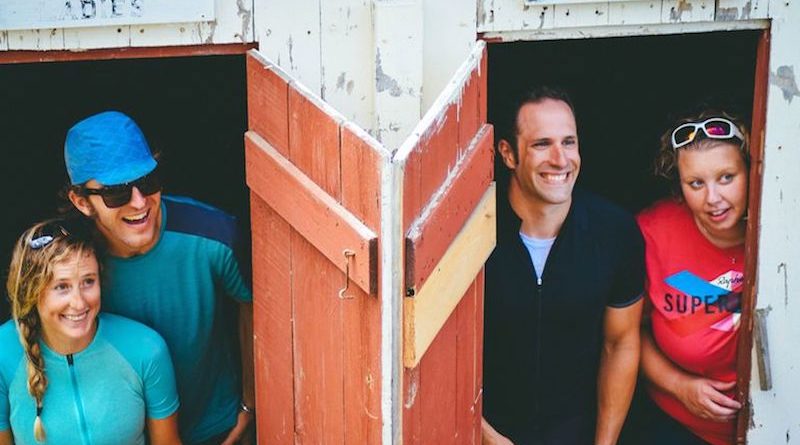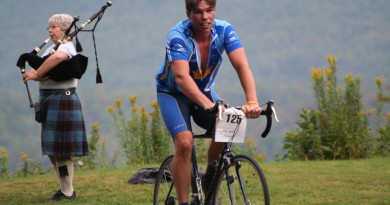Endgame: Gravel Redemption
If there’s anything tougher than riding 40 miles in mud and snow in April in the Northeast Kingdom, it’s the woman behind the now legendary Rasputitsa. Here’s her inspiring story.
BY HEIDI MYERS
Editor’s Note: This weekend, at least two Olympians will be racing in the 2019 Rasputitsa Gravel Ride. Look out for triathlete Sarah True and mountain biker Lea Davison on the trails.
It’s like riding on washboard. Your grip becomes a little tighter, even awkward. You aim for control but deep down inside you know that the road owns you. The vibration wears you down, exhausting both your body and your mind. This might sound like a common experience in gravel riding, but this is how I also describe daily life with Young Onset Parkinson’s Disease.
My name is Heidi Myers. I am a longtime cyclist, the co-founder of a gravel race in Vermont called the Rasputitsa Spring Classic and a 16-year bike industry marketing professional for Garneau.
Three years ago, I found myself unable to write. I could hold a pen, but when I took it to paper the result was tiny and illegible. That was just the beginning. I knew something was really wrong at the 2015 Bike MS Cape Cod ride, when arm tremors and shoulder stiffness kept me from finishing. I was just 10 miles from the line after completing 65 miles. I was diagnosed with YOPD less than a year after, at the age of 37.
Because of Parkinson’s, today I struggle with balance, memory, behavior, depression and movement disorders. My ability to ride a bike is limited because my right shoulder is so stiff I typically need to ride one-handed. I was never an extreme athlete, but I quickly went from doing century rides and half-marathons to barely being able to last 10 miles on a bike. When Stage 2 came along, my symptoms progressed to severe stiffness, tremors and severe depression.
Parkinson’s develops when the cells begin to die on the substantia nigra part of the brain. These cells produce dopamine, and the loss of that neurotransmitter is what leads to issues with movement. But dopamine also controls the brain’s reward system: When you cross the finish line at a bike race, your brain releases dopamine and makes you feel good about your achievement. With Parkinson’s, I see few dopamine rewards or finish lines. Life gets dark. The chemical changes in my brain cause negativity and stubbornness. Relationships suffer. I’ve lost emotional control in front of loved ones and family. I’ve spent months of my life withdrawn and crying daily.
There is no treatment, no cure, and some days, little hope of normalcy. This is why the biggest obstacle for me, and most Parkinson’s patients, is the lack of motivation to fight.
But I have one saving grace: the Rasputitsa Spring Classic.
There are studies that suggest people with Parkinson’s Disease may have higher levels of creativity. If that is in fact true, it’s manifested itself through my drive to create insanely challenging gravel road races. I founded Rasputitsa, a 40-mile gravel race in Vermont, five years ago, before my diagnosis.
Since my disease has progressed, organizing the race has become my source of happiness and my reason to push on.
The event has helped me pull through my internal struggles. With Parkinson’s, the combination of the inability to ride and my mental symptoms, which include cognitive impairment, often leads to a feeling of isolation. But because of Rasputitsa, one day a year I feel that I, too, belong. I lose focus on what I can’t do as I instead focus on what 1,500 people are trying to do. The emotional impact this has had on my wellbeing has been exponential. Even my family recognizes this.
When I was first diagnosed, they implored me to scale back on my duties with the event, to accommodate my handicaps. But now my husband, sons, parents, siblings and in-laws have come to recognize the power this race has on me, and they show up on race day to do any volunteer job I delegate to them. My sons Nolan, 12, and Thayer, 8, are growing up at gravel events. Nolan is our staff photographer and he supplies all our images on social media. Thayer runs our retail sales at the event. To them, April means Rasputitsa as much as December means Christmas.
The gravel racing community has been my redemption. What separates cycling from almost any other sport is community, and this one is like a family. Race day for me is a zillion hugs and handshakes. The bicycle has become a vehicle of hope. At Rasputitsa last year, I watched a group of girls decorate their bikes with #imwithheidi decals.
Olympian Lyne Bessette donated all the proceeds from 100b7, a gravel ride she puts on in Canada, to me. Olympian Lea Davison set me up with a mountain bike because she thought it would help my rigid upper body feel more comfortable. Over drinks at last year’s Rasputitsa, I connected deeply with 2017 Dirty Kanza champion Alison Tetrick and her struggles with traumatic brain injury.
Unlike disciplines like cyclocross or road racing, most gravel events are devoid of categories and thus elitism. It’s a mass start that ends in a shared beer at the finish line regardless of your ability. That’s why gravel breaks down barriers. It doesn’t isolate. Pros line up with amateurs and everyone celebrates together afterward. And when I see each rider power through the tough event I created, it makes me feel like I can power through too.
Redemption, redemption, redemption.
Living with a degenerative disease is a personal journey. But in both bicycle racing and life with Parkinson’s, knowing you’ll be able to have a beer at the end of the day with your friends gives you something to push for even when things get hard. If I can convey that to the world through my gravel events, if I can encourage more riders to go beyond their limitations as I continually work to go beyond mine, then that’s my reason to keep fighting.
Register for Rasputitsa at rasputitsagravel.com. In the print version of this story, Heidi Meyers also talks about the Redemption Gravel Stage Race, which, as of press time, was scheduled for Labor Day weekend, 2019. That race has been canceled.
Featured Photo Caption: Heidi Myers, far right, the co-founder of Rasputitsa, now Vermont’s largest bike race. Photo by Nolan Myers


